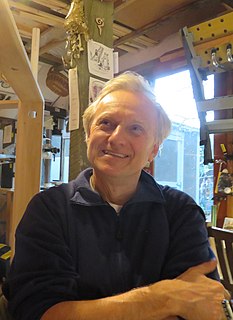A Quote by William T. Vollmann
At least for me, it takes more knowledge to write fiction than nonfiction. At least about someplace that I begin with a lot of ignorance about.
Related Quotes
I think, about the distinction between fiction and nonfiction. Fiction is not really about anything: it is what it is. But nonfiction - and you see this particularly with something like the BBC Samuel Johnson Prize for Non-Fiction - nonfiction we define in relation to what it's about. So, Stalingrad by Antony Beevor. It's "about" Stalingrad. Or, here's a book by Claire Tomalin: it's "about" Charles Dickens.
I write fiction longhand. That's not so much about rejecting technology as being unable to write fiction on a computer for some reason. I don't think I would write it on a typewriter either. I write in a very blind gut instinctive way. It just doesn't feel right. There's a physical connection. And then in nonfiction that's not the case at all. I can't even imagine writing nonfiction by hand.
There's more attention paid to entertainers than ever and less that they have to say. Not that entertainers were ever a great beacon of knowledge to begin with, but at least when the Beatles were the leaders of the culture, they had a message. It was brief; it wasn't terribly complicated. "Give Peace a Chance." "All You Need is Love." But at least they were trying. At least they had grown.
I guess it was easier for me to find my voice in poetry than it was in fiction. I'm working on fiction again, and I find it a lot more difficult. It's a struggle. At a certain point, you have your voice and you go to it every time, so it's not like reinventing the wheel. That's the way I see it at least.
Write a lot. And I mean a ridiculous amount. You have to write so much that you don't mind throwing away and changing things that you've written - which is the second thing you have to do. A lot of young writers are very precious about their words. Don't be - you've got to be ready to burn stuff. You're not as good as you think you are, at least not yet. The more you write, the faster you'll write, and the less you'll mind throwing stuff out.
If we can continue to come together and work on small things little by little, at least it's something. It's a start. At least now there's a lot more talk about climate change and the Earth's state than when I was a kid. I guess it's better late than never? But it's also very tricky because this is something that's so important to so many of us, and a lot of people don't see it that way. But hopefully, we can get all our points across to them - one by one, one person at a time.
I write my first draft by hand, at least for fiction. For non-fiction, I write happily on a computer, but for fiction I write by hand, because I'm trying to achieve a kind of thoughtless state, or an unconscious instinctive state. I'm not reading what I write when I wrote. It's an unconscious outpouring that's a mess, and it's many, many steps away from anything anyone would want to read. Creating that way seems to generate the most interesting material for me to work with, though.






































